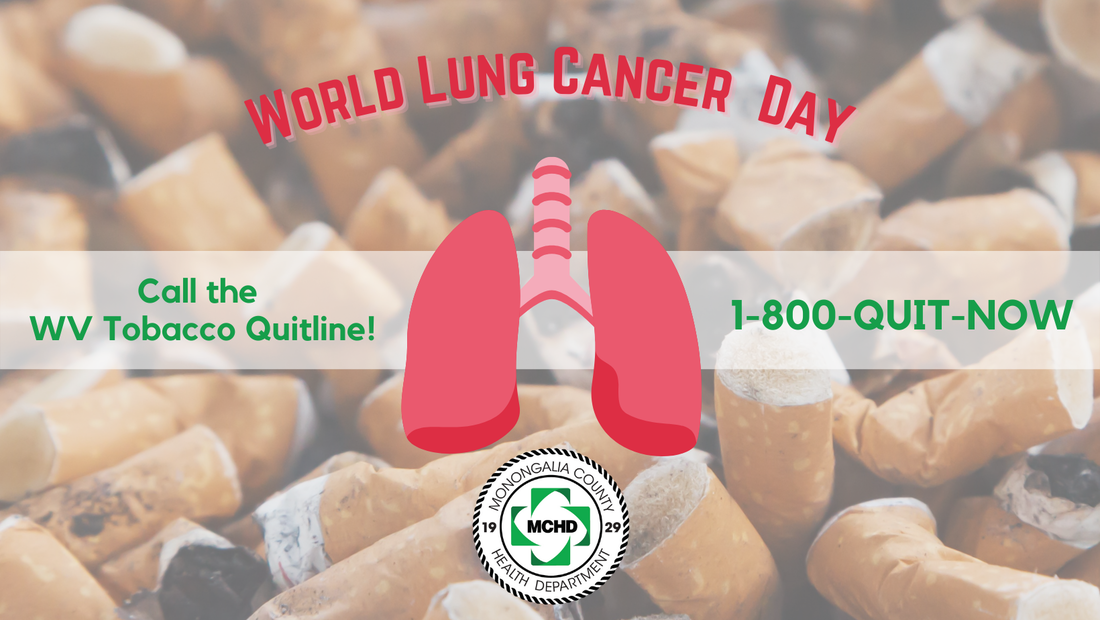Think about quitting smoking or vaping? Here are some reasons to consider

Jul. 30, 2021
By Katie Minor
It’s almost World Lung Cancer Day, so listen up, West Virginians!
For so many of us, we live in a culture clouded with cigarette smoke. Our parents smoked, their parents smoked and even now that we know how deadly it can be, smoking is still a big problem in our state.
And with World Lung Cancer Day approaching on Aug. 1, it’s important that we know the facts.
Last year, the United Health Foundation listed West Virginia as the least healthy state in the U.S. when it comes to tobacco use. In West Virginia, 23.8% of residents reported smoking at least 100 cigarettes in their lifetime and currently smoke daily. The national average is 15.9%. These numbers are lower than past years, and smoking rates are slowly decreasing, but West Virginia still has some work to do.
There are a lot of factors that affect West Virginia’s high rate of smoking. One of them is poverty. Generally, those with an annual household income of $25,000 or less are more likely to smoke cigarettes than those with an annual household income of $75,000 or higher. With West Virginia being one of the country’s most impoverished states, it becomes much more likely that people here may smoke.
Even those affected by secondhand smoke are at risk. Secondhand smoke, which is the combination of smoke from the burning end of a cigarette and smoke breathed out by smokers, contains more than 7,000 chemicals and can still cause cancer. According to the Centers for Disease Control and Prevention, 2.4 million non-smoking adults since 1964 have died from secondhand smoke. Sadly, many of those affected by secondhand smoke are young children and teens living in a household with a smoking family member.
While teens affected by secondhand smoke do not make the choice to be exposed, teens are also fighting the risks of smoking themselves. In 2019, 13.5% of high school students in West Virginia reported smoking cigarettes, compared to the national rate of 6%.
Lately, though, if you walk past a group of teenagers or a high school party, you are much more likely to see clouds of sweet-smelling vapor than smoke. While the number of cigarette-using high schoolers in West Virginia is high, more high school students report using e-cigarettes or vapes. Last year, 19.6% of high schoolers vaped regularly.
There is not a lot of research done on vaping, and since it is a fairly new practice, we likely won’t see the effects for years to come. Still, studies have shown correlations between vaping and contracting lung cancer later in life. Research has also shown vaping leads to a greater likelihood of smoking cigarettes in the future.
Not only that, but in August 2019, hospitals began reporting a surge of lung illnesses in vape users, including some in their teens and 20s. As of February 2020, there were a total of 2,807 hospitalizations or deaths reported by the CDC from all 50 states, the District of Columbia, and Puerto Rico and the U.S. Virgin Islands. Sixty-eight of those were deaths that took place in 29 states and D.C.
The best way to avoid lung cancer is to avoid tobacco and vaping. Tobacco use is not only the leading cause of lung cancer, but also damages nearly every organ, weakens the immune system and leads to stroke, heart disease, respiratory disease and diabetes.
It’s difficult to quit smoking or vaping, as most people become dependent on the addictive drug nicotine found in tobacco and vapes. While it takes time and effort to quit smoking, there are plenty of benefits. Quitting smoking increases your quality of life and life expectancy and lowers your risk for virtually every disease. Even if you’ve smoked for many years, you will still benefit from quitting.
The best course of action is a combination of medication and counseling. The West Virginia Tobacco Quitline is a program for those who want to quit using tobacco, and is available free or low-cost, depending on your insurance. Participants can sign up online to receive calls with coaches to assist in quitting. The calls are free, and smokers are twice as likely to quit smoking when they have a coach.
The program also offers an eight-week supply of nicotine patches, lozenges or gum. Just call 1-800-QUIT-NOW to get started with the West Virginia Tobacco Quitline.
While quitting might feel impossible, millions of people have been successful in quitting smoking for good. Why not make some strides towards a healthier life today?
Katie Minor is a public information office intern at Monongalia County Health Department.